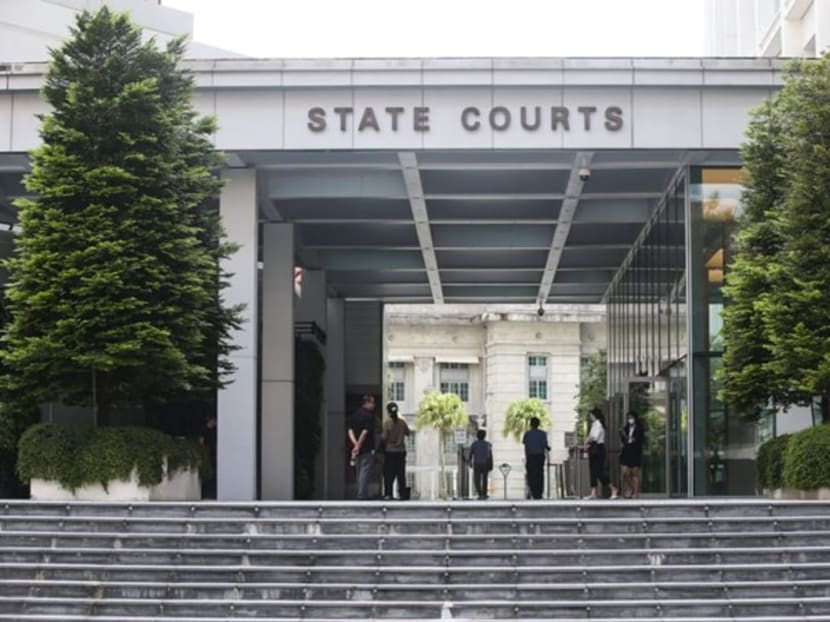Jail for ex-Chubbs Insurance employee who cheated company into disbursing S$11m in false claims over 7 years
SINGAPORE — For seven years, a senior claims executive at Chubbs Insurance executed what a judge described as an “elaborate scheme” to cheat his employer into disbursing over S$10.74 million in fraudulent claims.

A view of the State Courts building.

This audio is AI-generated.
- A senior claims executive at Chubbs Insurance had for seven years duped the company into paying out S$10.74 million in fraudulent claims
- He did this by sending forged emails and falsifying records in the company's computer system
- Suyandi, a 46-year-old Singapore permanent resident, used part of the proceeds to pay off his gambling debts
- On Monday (April 29), he was sentenced to jail for 10 years and 10 months
SINGAPORE — For seven years, a senior claims executive at Chubbs Insurance executed what a judge described as an “elaborate scheme” to cheat his employer into disbursing over S$10.74 million in fraudulent claims.
This was done by sending forged emails and directing the funds to various accounts belonging to individuals not involved in the scheme but whom he had owed money to due to his gambling habits.
The executive, 46-year-old Singapore permanent resident Suyandi, was on Monday (April 29) sentenced to a prison term of 10 years and 10 months.
This was after he pleaded guilty to two counts of forgery for the purposes of cheating, three counts of cheating, two counts of falsification of accounts and one count under the Corruption, Drug Trafficking and Other Serious Crimes (Confiscation of Benefits) Act.
A total of 14 similar charges were taken into consideration for sentencing.
WHAT HAPPENED
According to court documents, Chubb Insurance had at one point discovered “some indication” that Suyandi, who came from Indonesia and goes by one name, was involved with various false insurance claims submitted to the company.
The company then hired a forensic accountant to investigate the claims he had processed, before lodging a police report on Nov 2, 2017, said Deputy Public Prosecutors Koh Yi Wen and Yohanes Ng.
His employment was terminated on Nov 3, 2017.
Investigations found that he was involved with processing 355 false and unauthorised claims totalling about S$10.74 million between May 26, 2010 and Sept 13, 2017.
“According to the accused, the beneficiaries were unaware that the payments they received were fraudulent payments,” said the prosecutors.
These beneficiaries comprised Suyandi’s acquaintances or debtors whom he owed money to as a result of his gambling habit.
He would allow some of these beneficiaries to retain 3 to 10 per cent of the monies received in exchange for them sending the remaining monies to him through remittance.
He subsequently used the monies for his own use and to settle his gambling debts, the prosecution added.
THE MODUS OPERANDI
According to the court documents, this is how a claim would be made:
- The claim is typically initiated via email from a claimant
- A claims executive, like Suyandi, would process it, determine the amount to be paid out and key in the details into the company’s computer system
- The executive then would send the payee’s details via email to another department within Chubbs for the payment to be effected
Between Jan 5 and Oct 12, 2012, the accused sent 14 false emails to other staff members of the company which included details like the payee’s name, bank account details and amount payable, to instruct the employees to process the claim payout.
He repeated this with a varying number of emails each year from 2012 to 2016.
On other occasions, Suyandi created false claims on the company’s computer system to dupe the company into processing such fraudulent claims and making payouts.
He did these on various occasions from 2012 to 2017.
For example, he did so on nine occasions in 2012, 62 times in 2016 and 210 times in 2017.
In May 2016, some executives including Suyandi were given the ability by the company to reverse claim disbursements in the computer system.
Between May 2016 and Sept 2017, the accused reversed some of the disbursements of the false claims he made, in an attempt to cover his tracks.
“These claim disbursement reversals allowed the accused to prevent a spike in expenditure from being reflected in the company’s records, thus ensuring that the false claims he had created would not arouse suspicion,” said the prosecutors.
From March to June 2014, Suyandi also acquired S$43,600 in payments into his Citibank account or credit card, which formed part of the monies he cheated from the company.
Suyandi has not made any restitution to the company to date.
In delivering her decision, District Judge Sharmila Sriparthy-Shanaz said the case was an “elaborate scheme” of insurance fraud that spanned a long period and involved a large sum.
The company had to “bear the full extent” of the losses as “all the funds have been dissipated and not a single cent of restitution has been made”.
Suyandi’s offences also involved a gross abuse of trust and had the potential to adversely affect public confidence in the insurance industry.
The judge said that she also “cannot ignore” the steps he took to try to cover his tracks, and that the offences were driven by “self interest”.
However, she took into account several mitigating factors, such as his plea guilt and his cooperation with the authorities.
For each count of cheating or of forgery for the purpose of cheating, Suyandi could have been sentenced to jail for up to 10 years and a fine.
Each falsification of accounts offence could have attracted a jail term of up to 10 years, or a fine, or both.
For each conviction under the Corruption, Drug Trafficking and Other Serious Crimes (Confiscation of Benefits) Act, he could have been fined up to S$500,000, jailed up to seven years, or both.










